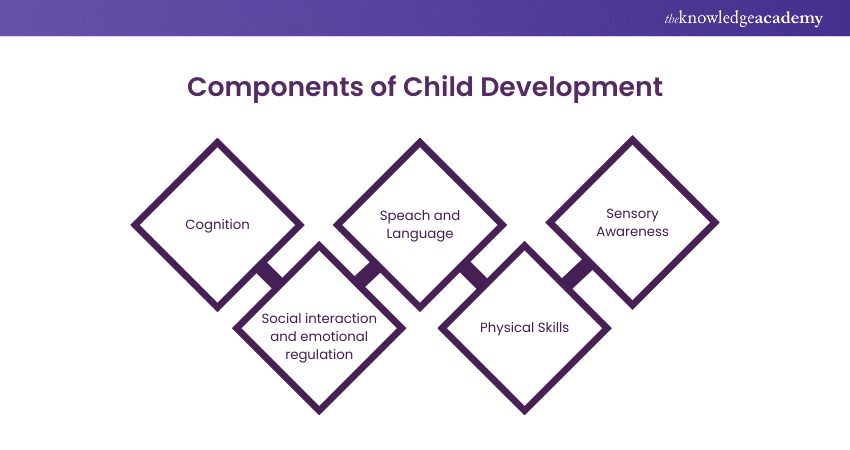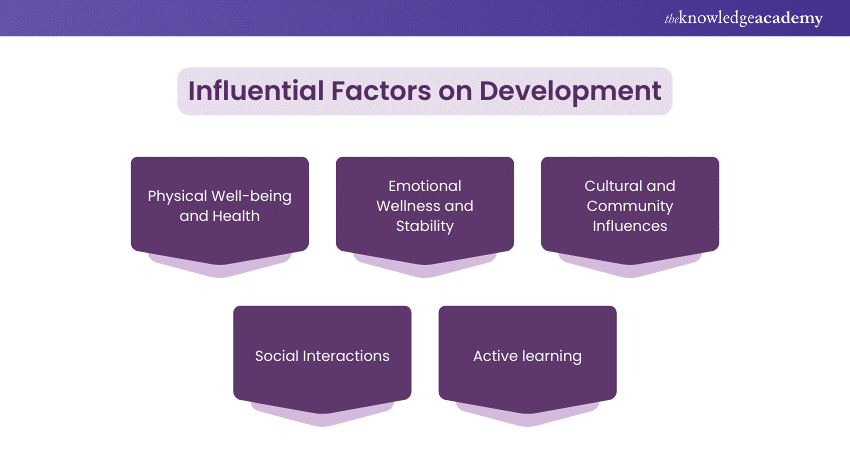We may not have the course you’re looking for. If you enquire or give us a call on 01344203999 and speak to our training experts, we may still be able to help with your training requirements.
Training Outcomes Within Your Budget!
We ensure quality, budget-alignment, and timely delivery by our expert instructors.

The journey from birth to entering society as a functional being is like rewatching evolution happen but in fast forward mode. The development of a child from learning how to breastfeed to learning to eat by on self is longer and more complex than you think. Child Development teaches us about the motor skills the child must develop in order to simply be able to hold a spoon.
It is a study on the fundamentals of our life and how the journey of human life begins. This blog will take you through the nuances of Child Development and the different milestones one crosses at the beginning of their life.
Table of Contents
1) What is Child Development?
2) Why is Child Development important?
3) Components of Child Development
4) Developmental Milestones
5) Influential Factors on Development
6) Measuring Physical Child Development: Growth Charts
7) Challenges in Child Development
8) Conclusion
What is Child Development?
Child Development is the process through which a child advances physically, as well as in language, thought, and the emotional changes from birth to the beginning of adulthood. The child becomes independent gradually as they grow up in this process.
One's development depends on contributions from genetic factors, such as genes passed on from their parents, and prenatal life events. Environmental factors equally influence Child Development and contribute to the child's learning capacity.
Child Development is actively enhanced through targeted therapeutic intervention and some home-based practices that are recommended and practiced by Occupational Therapists and Speech Therapists.
Why is Child Development important?
Monitoring Child Development is a powerful tool to ensure they meet every milestone and are growing at the same pace as their peers. Disturbances in development as a child may lead to dysfunctionality as an adult or other behavioural issues. These milestones are a list of developmental skills typically mastered around the same time for all children. They serve as useful guidelines for ideal development.
By checking a child's progress against these age markers, you can do a 'check-in' to make sure they're roughly 'on track' for their age. This process, usually conducted by child/mother services and paediatricians during infancy and toddlerhood, and later through preschool and school assessments, helps detect any early developmental hiccups.
Early detection and, if necessary, early intervention for developmental challenges can reduce their impact on a child's skill development and confidence, or even indicate a potential future diagnosis. Developmental milestone checklists or charts guide what is 'normal' for specific age ranges, highlighting any areas where a child might be delayed.
However, it's crucial to remember that while Child Development follows a predictable sequence, each child is unique in their developmental journey and the time frames within which they achieve these milestones.
Components of Child Development
Now that you know what Child Development is, you might want to better understand its five major components. Those five components cover each element of a Child’s Development.

1) Cognition – The child's ability to learn and solve the problems presented to them
2) Social interaction and emotional regulation – The child’s ability to understand and interact with their environment.
3) Speech and language – Learning new languages, reading right and communicating in different ways.
4) Physical skills – The fine motor (movement of fingers) and gross motor (movement of the body) skills that control their ability to do things physically.
5) Sensory awareness – The ability to use each sense appropriately, including vision, hearing, touch, etc.
Developmental Milestones
Developmental milestones, you must be wondering what they are! Well, let this blog explain. The milestones are simply the benchmarks each child fills in in their developmental process.
The Milestones as an infant are:
1) First cry after birth
2) Smiling with intent
3) Waving
4) Moving objects and transferring them from one hand to another
5) Transition from crawling to walking.
Growing older, the milestones are a little more complex like:
1) Retaining names of people and things
2) Using sentences of three to four words
3) Differentiating shapes and colours
4) Retaining and reenacting poems or songs from memory
5) Storytelling.
As they grow bigger, their milestones evolve accordingly.
Influential Factors on Development
For a child to develop in the healthiest ways, there are a few factors that play a big role. To further understand the factors in Child Development, read the following points:

1) Physical Well-being and Health
To be physically healthy the child needs a combination of healthy nutritious food as well as a healthy amount of physical activity. The movement while they play stimulates parts of their brain in ways that promotes growth and development. They must eat nutritious food to support this growth.
2) Emotional Wellness and Stability
The child’s relationship with their caretakers and peers in their early life will act as a framework for their personality. Having a good home environment helps the child have a sense of security and stability. This further facilitates healthy development.
Learn to manage stress mindfully and build resilience with our Handle Stress And Develop Your Resilience - register now!
3) Cultural and Community Influences
A sense of community is a very important element in Child Development, which is subjective in nature of the culture they belong to and plays a big role in the development of the child. Educating the child about different cultures and modelling respect helps promote a more accepting nature in the child.
4) Social Interactions
Often when a child is introduced to new adults, the parents prompt the child to say, “hello” and when given a gift the parent’s often prompt the child to say, “thank you”. This helps the child understand the norms of social interactions and how to communicate with their social environment.
5) Active learning
The child must have an abundance of opportunities to learn from. This helps diversify the child’s knowledge of the world and how to appropriately participate or manage in a situation. The child must actively learn from their parents and peers.
Measuring Physical Child Development: Growth Charts
Children grow at their own individual rate, with a wide variety of healthy sizes and shapes among them. Factors like genetics, gender, health problems, nutrition, physical activity, environment, and hormones all play a role in determining a child's height and weight, and these can vary widely within families.
Doctors often consider growth charts alongside a child's overall well-being, environment, and genetic background. They may also evaluate with the help of these factors:
1) Is your child reaching other developmental milestones?
2) Are there signs that suggest the child is not healthy?
3) What are the height and weight of the child's parents and siblings?
4) Was the child born prematurely?
5) Has the child shown signs of starting puberty earlier or later than average?
Aid in creating a safe space for everyone around you with our Mindfulness Training - sign up now!
Challenges in Child Development
Child Development problems can arise due to genetics, prenatal circumstances, specific diagnoses, medical factors, or lack of exposure to helpful stimuli. Specific assessments by appropriate professionals (initially a GP or Paediatrician, and possibly an Occupational Therapist, Speech Therapist, Psychologist, and/or Physiotherapist) can clarify the developmental issues and formulate a plan to overcome the challenges.
Since Child Development involves developing multiple skills simultaneously, consulting multiple professionals may be beneficial.
Overcoming developmental challenges is crucial for maximising the ease and speed of development, minimising the gap between a child’s abilities and those of their same-aged peers, boosting the child’s confidence, and reducing the frustration experienced by parents and caregivers.
Conclusion
This blog explained to you the journey of birth to being a young adult, encapsulated in Child Development. It discussed the different components, milestones and influencing factors and measures used. Additionally, it discussed the associated challenges to sum it up.
Learn how you can prevent psychological distress that can lead to extreme adversities. Sign up for our Prevention Psychology Training - register now!
Frequently Asked Questions

There may be a lot of debate on this subject matter, but the most important thing in a Child’s Development is nurture. The nurture the child receives in their early life frames the person they grow into.

Child Psychology aims to identify, acknowledge and rectify Child Development disturbances. Apart from this, it aims to create a safe space for children with unique needs and aids them in every possible way.

The Knowledge Academy takes global learning to new heights, offering over 30,000 online courses across 490+ locations in 220 countries. This expansive reach ensures accessibility and convenience for learners worldwide.
Alongside our diverse Online Course Catalogue, encompassing 17 major categories, we go the extra mile by providing a plethora of free educational Online Resources like News updates, Blogs, videos, webinars, and interview questions. Tailoring learning experiences further, professionals can maximise value with customisable Course Bundles of TKA.

The Knowledge Academy’s Knowledge Pass, a prepaid voucher, adds another layer of flexibility, allowing course bookings over a 12-month period. Join us on a journey where education knows no bounds.

The Knowledge Academy offers various Health & Safety Courses, including Advance First-Aid Training, Active and Healthy Lifestyle Training, and Counselling Certifications. These courses cater to different skill levels, providing comprehensive insights into What is Child Psychology.
Our Health & Safety blogs cover a range of topics related to Child Psychology, offering valuable resources, best practices, and industry insights. Whether you are a beginner or looking to advance your Health and Safety knowledge, The Knowledge Academy's diverse courses and informative blogs have you covered.
Upcoming Health & Safety Resources Batches & Dates
Date
 Child Psychology Course
Child Psychology Course
Fri 27th Sep 2024
Fri 20th Dec 2024







 Top Rated Course
Top Rated Course



 If you wish to make any changes to your course, please
If you wish to make any changes to your course, please


